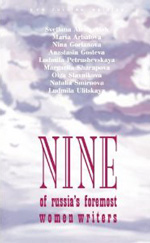

GLAS: New Russian Writing, paperback, 9785717200639
If this anthology of recent writing by these nine Russian authors has a theme, it's the variety of approaches a modern writer can take. No use wishing for a different title than the simple one chosen by the editors; the stories are as various as Russia.
In "Landscape of Loneliness: Three Voices" by Svetlana Alexiyevich (trans. Joanne Turnbull) the author takes a fascinating and unusual approach. Each of the three sections is based on interviews with a different woman, examining her experiences during the Soviet era. Each of the three found ways of having a private life during an extremely harsh time.
"My Name is Woman," by Maria Arbatova (trans. Kathleen Cook), tells the story of a young woman's misadventures in a severely mismanaged obstetric/gynecological system. The many touches of humorous absurdity show the deep disrespect of the system for the women it serves.
Nina Gorlanova (trans. Jane Chamberlain) introduces us to Masha, nearing the end of her pregnancy, and her misadventures in a hospital which, though crowded with patients, does not officially exist, in "How Lake Jolly Came About." The authorities believe that it has been replaced with a splendid new facility, torn down, and its site covered with a lake. As Masha reflects: "I'm staying in a hospital that doesn't exist, talking about a husband I don't have." I may have to take back my claim about no common themes: the reader will likely decide that encounters with Soviet obstetrics would have been a very bad idea.
Granny Olya, in "Waterloo Bridge," by Ludmila Petrushevskaya (trans. Sally Laird) escapes from her mundane, unsatisfactory existence by joining a society of women obsessed with the Robert Taylor/Vivien Leigh film of that title. She transforms her and her family's lives as she visits showings of the film at theater after theater.
How better to see the countryside of a newer Russia, than by following the wanderings of two animal trainers and their giant St. Bernard, who have accidentally been left behind by the freight train hauling the circus they work for? In Margarita Sharapova's "Comfuture" (trans. José Alaniz) they hitch rides to various stops, including the station formerly named "Communist Future," which is now called, of course, "Capitalist Prospects," although matters there have decidedly not improved. They encounter gangsters and secret military trains during their amusing odyssey.
Olga Slavnikova's "Krylov's Childhood" (trans. Marian Schwartz) is the first chapter of what looks to be an intriguing novel about a young man growing up in a tough, desolate town in the Urals. He begins life with both minor criminality and a fascination with the jasper, quartz, and other crystals of the region. In the transparent depths of crystals he perceives a mystery: one can see through them, but breaking them only creates new crystals, it does not allow access to an interior.
In "Women's Lies", (trans. Arch Tait) Ludmila Ulitskaya examines another mystery. Two women meet on holiday, and one tells gripping, dramatic stories of her life to the other. But are they true? And what effect will hearing them have on the listener, when she hears future stories?
The remaining stories, by Anastasia Gosteva, Natalia Smirnova, and the writers already named, are as interesting and
different as those I have noted. Each author could lead a reader to further exploration of her books and stories; each
story is well worth the reader's time.
